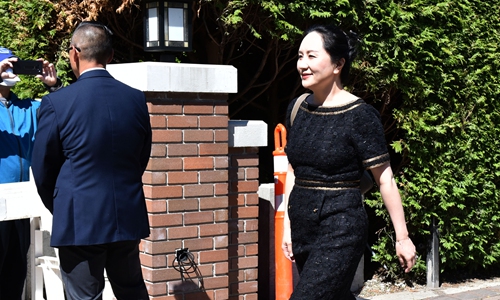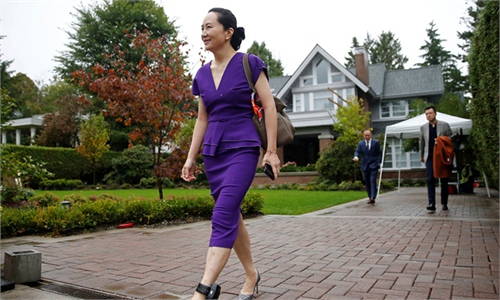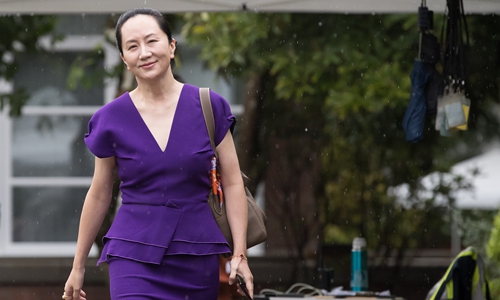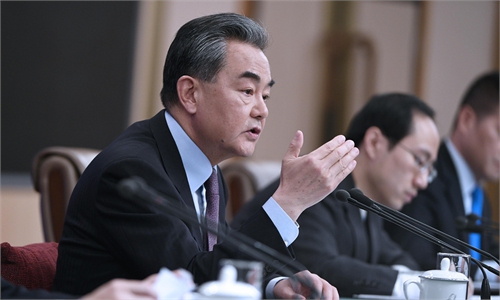Canada urged to correct mistakes immediately
Direction of ties depends on 5G decision, Meng Wanzhou case: analyst

Huawei Chief Financial Officer Meng Wanzhou leaves her Vancouver home on May 27, 2020 to appear in British Columbia Supreme Court. Photo: AFP
China on Wednesday reiterated its stance over relations with Canada amid deteriorating bilateral ties and a new court ruling that was unfavorable to Huawei's Meng Wanzhou, urging the Canadian side to make the correct choice and create conditions to bring the relationship back to normal.
"The current difficulties in China-Canada relations do not lie with China. The Canadian side is well aware of the crux of the problem and should immediately take effective measures to correct the mistakes and create conditions for the relationship between the two countries to get back on track," Zhao Lijian, spokesperson of China's Foreign Ministry, told a regular press conference.
China's legal departments are strictly handling cases in accordance with the law and protecting the legal rights of two Canadian nationals - Michael Spavor and Michael Kovrig - who are suspected of committing acts that endangered China's state security, Zhao said.
"Canada should respect the rule of law and China's judicial sovereignty - a position that we've expressed in all communications with Canada," Zhao said.
The remarks came after a meeting between the foreign ministers of the two countries, during which Meng's case was high on the agenda. On Tuesday in Rome, during a week-long visit to Europe, Chinese State Councilor and Foreign Minister Wang Yi met Canada's Minister of Foreign Affairs François-Philippe Champagne, calling on the Canadian side to make a decision as soon as possible to eliminate obstacles between the two countries.
China and Canada do not have any historical entanglements or actual conflicts, but due to the unprovoked detention of a Chinese citizen by Canada, relations between the two countries have encountered serious difficulties, Wang told the Canadian official.
"The two foreign ministers met in a third country, thus it was not at the same level as an official visit, but it showed there is still room for negotiations between China and Canada. The effect of the talks and the direction of the bilateral relationship depends on the follow-up performance of Canada," He Weiwen, an executive council member of the China Society for World Trade Organization Studies, told the Global Times on Wednesday.
On the day of the meeting, Meng's legal team lost its latest court battle - a Canadian federal judge refused to give Meng access to sensitive information contained in reports on her arrest produced by Canada's spy agency, Canadian Broadcasting Corp reported on Tuesday.
The ruling came after the Supreme Court of British Columbia in Canada held a hearing last week on whether or not the judicial process had been abused when the US requested the extradition of Meng from Canada and whether information should be further released about Meng's arrest.
In documents filed with the court on August 17, Meng's defense team argued that she "reasonably believes that many documents are the subject of excessive redactions and overly broad claims of privilege. It is likely that there is redacted information that is relevant to her abuse of process allegations," according to media reports.
"The unfavorable ruling was expected, as Meng's case is not a legal case at all, it's a political one, and whether Wang's visit will work really depends on Canada's choice," He said.

Chinese officials and legal experts have long stressed that the case is a serious political incident that the US concocted to suppress Chinese high-tech enterprises and Huawei, and Canada has been an accomplice of the US.
Meng's defense team is now targeting the alleged abuse of process - one of the major controversial points in the extradition case.
"Whoever started the trouble should end it," Wang said, urging the Canadian side to take the stance of an independent country and make a decision as soon as possible to eliminate obstacles in the relationship.
The Chinese Foreign Ministry has warned multiple times that the longer the case against Meng continues, the deeper the damage will be to relations with China.
This year marks the 50th anniversary of the establishment of diplomatic relations between China and Canada, Wang said.
"Fifty years ago, Canadian leaders removed external interference and withstood pressure from all parties to achieve the establishment of diplomatic relations with China, which was the correct step," he added.
Canada is the only member of the Five Eyes intelligence-sharing network that has not formally blocked Huawei from its 5G networks. Canada and its Five Eyes allies are under pressure from the US, a fellow member, to keep out Huawei, citing so-called security concerns.
Canada has become increasingly dependent on China in recent years - China is now Canada's third most important export destination and import source. Top China's exports to Canada are mainly mechanical, electronic products and furniture, while top Canadian exports to China are natural resources.



